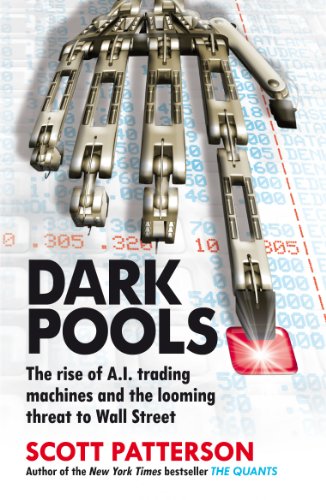Dark Pools Audiobook – Scott Patterson (The Rise of the Machine Traders and the Rigging of the U.S. Stock Market)

You can quit bothering with naked short-sellers or conventional market manipulators, claims Scott Patterson– the ‘crawler algos’ (formulas) have taken over. Dark Pools Audiobook – Scott Patterson Stream. Dark pools are exclusive markets hidden from the typical financier– the reverse of displayed or ‘lit’ markets such as the NYSE or Nasdaq.
The large computerised systems of the exchanges were developed by ‘plumbings’, however after that a new breed of investor emerged that, says Patterson, ‘concentrated on pc gaming the plumbing itself, manipulating intricate loopholes and also quirks inside the plans like card-counters hunting down weak points in a blackjack dealer’s hand’.
Due to the fact that robot trading machines were front-running lasting financiers such as mutual funds on the lit markets, anticipating their buy or offer orders as well as driving the rates up or down as necessary, those lasting investors started switching to dark pools. By 2012, 40 percent of all trading volume was taking place in dark swimming pools. Today the dark swimming pools are swarming with killer robots as well.
This might sound like science fiction– and Patterson, like Dickens’s fat young boy, ‘wants to make your flesh creep’– but it is really happening. The Flash Collision of 6 Might 2010, throughout which the Dow Jones index fell by 800 points, was triggered by technical glitches in the system and frightened the regulators. There is even a name for an occasion that hasn’t took place yet however might, if this were to take place on a worldwide range– Sprinkle Accident– and that can create what Financial institution of England economic expert Andrew Haldane has actually called a ‘double liquidity gap’ (a lack of short- as well as long-term purchasing).
Patterson, who formerly created a successful book called The Quants, about the mathematical whizz-kids behind the by-products that triggered the worldwide financial crisis, has mapped the history of the crawlers (as well as the human individualities behind them) from the intro of computerised trading in the very early Nineties. Since 1996, when computer designer Josh Levine created Island, a trading system that bypassed market makers, the market has been dominated by trading makers. What complied with Levine’s Frankenstein minute came to be called the Algo wars, in which very leveraged, high-frequency traders contended to be the fastest, with talk last year of one day being able to determine trades in picoseconds (trillionths of a 2nd).
As in an arms race, both sides are frequently seeking to outsmart and also outshine each other in technological terms. Algos were ‘like hunted victim attempting to conceal their tracks through feints and evades’, however hunter-seeker radars ‘adapted to the new stealth strategies as well as expected them, preparing for every move’. With names like Shark, Guerilla, Stealth, Thor and Sniper, by 2011 the ‘brainless algos had advanced right into hazardous beasts of prey’.
High-frequency trading became so affordable that no trader might earn money at high volumes. The big scandal has been that a few of the high-frequency traders have actually been working together with the exchanges to clip ordinary investors in a set up market. Just trading business that were in on the setup have the ability to survive by using unique order types– transmitting or trading guidelines.
At the same time, Brain Capital, a fund without very paid investors yet an ‘Innovation Equipment’, was able to create a steady return of 7 percent via mini-robot-traders. ‘The device would kill off the traders that had actually done the worst and change money to the investors that did the best. This would certainly lead to anomalies in the approaches– totally brand-new formulas.’
Yet the holy grail of artificial intelligence on Wall Street is to produce the AI-equivalent of Warren Buffett. In 2007 a hedge fund called Rebellion released an AI program called Star. Its developer, Spencer Greenberg, informed a celebration of quants in February 2011: ‘The goal is to have our software learn, by itself, to end up being a long-term-oriented stock investor. Dark Pools Audio Book Free. We do not presume that we currently know how to spend, as well as are not making use of artificial intelligence just to optimize a few criteria in our design. Rather, we are leaving it up to our finding out algorithm to learn to spend.’